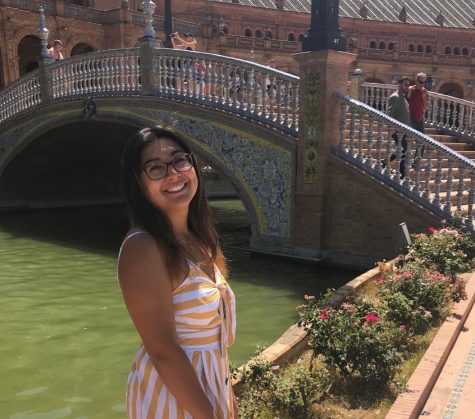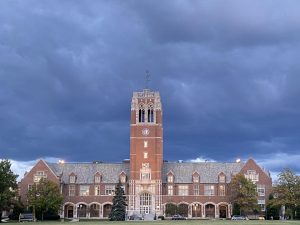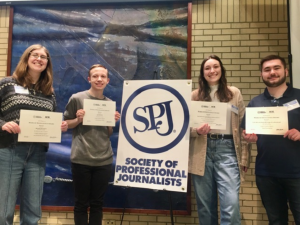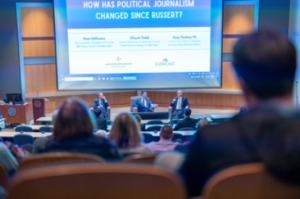People Are Dying, Yet No One Is Acting
Oct 17, 2019
When I arrived at the Green Road annex for my internship last week, I was shocked by the police presence there. Four police cars were stationed outside the front entrance to the building and one near the back entrance.
I had never seen such commotion at the small building in University Heights, only the usual bustle of JCU’s Labre ministry. I asked one of my bosses about the additional security, and I was shocked by her response.
Our office shares the building with a Jewish community center, and people were gathering together to celebrate Yom Kippur, the holiest day of the year in Judaism.
Due to the frequency of mass shootings at places of worship in the United States, the Jewish community felt that it was necessary to have heavy security around the building.
I’m not sure why I was so shocked about this decision, as mass shootings have tragically become part of American life.
Defining a mass shooting as an incident where four or more people have been shot, an article from CBS News reported that there had been 283 mass shootings in 2019 through Sept. 1, indicating that the number of mass shootings was higher than the number of days in the year at the time of the article’s publication.
As explained in a New York Times article, religious institutions have been recurring settings for these tragedies, including an African American church in South Carolina in 2015, where nine people were killed, a church in Texas in 2017, where 26 people were killed, and the Tree of Life Synagogue in Pennsylvania in 2018, where 11 people were killed. Looking internationally, there have been recent attacks on a mosque in New Zealand and a synagogue in Germany.
People are dying.
No wonder the people from the Jewish community center felt compelled to ask for security. I am deeply saddened and appalled by the fact that we live in a world where people are literally fearing for their lives in places that are supposed to be safe, a world where the mass murder of innocent people has become a commonplace occurrence, a world where unjust policies have created conditions where people can so easily act on their hatred and intolerance.
A Washington Post article reporting on mass shooting trends in the U.S. stated that mass shootings “are always shocking but may be getting less surprising.” I never thought I would live in a world where mass shootings would cease to be surprising, but here we are.
In addition, our administration refuses to take action or to make any drastic change in policy, such as placing a ban on assault-style weapons, which would likely put an end to the extremely high death toll of mass shootings.
Many people who reject strict gun regulations often cite the Second Amendment, which asserts “the right of the people to keep and bear arms.”
However, I highly doubt that the Founding Fathers wrote the Bill of Rights with the knowledge that weapons like the Sig Sauer MCX rifle that fires 160 rounds per minute and was used by the Orlando Pulse shooter would someday exist.
For this reason, I return to the idea of reading “the sign of the times,” a phrase developed during the transformational Second Vatican Council.
While this phrase is used to describe the practice of applying the Catholic faith to modern-day issues, I believe it is relevant in this situation and many others where the interpretation of any long-established documents are involved.
So, if people want to defend themselves with guns, let them. But don’t let them get their hands on a weapon that can fire 100 shots in 10 seconds.
People are dying.
According to the same CBS News article, there have been 9,932 gun deaths and 19,868 gun injuries in the U.S. as a result of shooting incidents in 2019 as of Sept. 1. Despite these statistics, President Donald Trump’s administration has done little to remedy the issue. If the deaths of thousands of innocent people at the hands of senseless gun violence isn’t enough to shock the current administration into change, I’m not sure what will.
Meanwhile, New Zealand Prime Minister Jacinda Ardern has taken the opposite approach, agreeing to reform gun control laws immediately after the mosque attacks in March 2018.
A PBS article details how, three days after the mass shooting, Ardern said her cabinet had agreed to reform the country’s gun laws.
One aspect of her new policy includes a ban on military-style semi-automatic weapons and high-capacity magazines. However, in the U.S., Trump and many other government leaders continue to offer their thoughts and prayers with no action.
In addition to the lack of action taken, Trump has refused to acknowledge his own hateful rhetoric. While establishing causation between political discourse and mass shootings is implausible, a relationship is present.
According to an article in AP News, a correlation exists between “heated rhetoric from top political leaders and ensuing reports of hate crimes.” The article provides substantial evidence to support this claim, based on an analysis of FBI data by the Center for the Study of Hate and Extremism at California State University.
For example, Trump argued for “a total and complete shutdown of Muslims entering the United States” after a shooting by a Muslim couple that killed 14 people in California in 2015. Almost two weeks later, hate crimes against Muslims nationwide increased by 23%.
In August 2017, during the protests by white supremacists and their opposition in Charlottesville, Virginia, Trump asserted that there were “very fine people on both sides.” Nationwide hate crimes increased to 663 cases, the second-highest number in almost 10 years.
I was most struck by the possible relationship between the El Paso, Texas massacre and Trump’s rhetoric surrounding immigrants and undocumented people.
Trump has continuously used language like “invasion” and “illegals” when referring to immigrants, as explained in a PBS News article. These sentiments were echoed in the El Paso shooter’s manifesto, which details the shooter’s motive as a response to the “Hispanic invasion of Texas.”
The researchers acknowledge that intervening causes for these hate crimes may be present and that hate crime data is often incomplete because areas of detail often go unreported. However, the data is still significant.
While Trump’s discourse surrounding minority groups is not the primary cause of these mass shootings, it sure doesn’t help.
This disrespectful political rhetoric promotes the dangerous mindset of: “Well, if our president can say that and do that, then I can too.” Throw a gun in the hands of someone with his mindset, and we have a problem. No, we have our reality.
People are dying.
It’s time to act.












